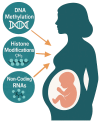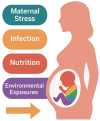From Womb to Mind: Prenatal Epigenetic Influences on Mental Health Disorders
- PMID: 40649875
- PMCID: PMC12250387
- DOI: 10.3390/ijms26136096
From Womb to Mind: Prenatal Epigenetic Influences on Mental Health Disorders
Abstract
The intrauterine environment is increasingly recognised as a critical period for the emergence of mental health vulnerabilities. This review explores how adverse maternal exposures, such as psychological stress, infection, malnutrition, and environmental toxins, can disrupt foetal neurodevelopment via epigenetic mechanisms, contributing to the risk of psychiatric and neurodevelopmental disorders. Focusing primarily on human studies, we synthesise evidence on DNA methylation, histone modifications, and non-coding RNAs as key pathways through which the intrauterine environment influences gene regulation in the developing brain. We examine how timing of exposure, foetal sex, and gene-environment interactions modulate these effects, with particular attention to disorders such as schizophrenia, autism spectrum disorder, depression, and anxiety. The placenta emerges as a central mediator, both reflecting and shaping epigenetic changes in response to maternal signals. We also discuss the reversibility of epigenetic marks and highlight emerging interventions, including nutritional supplementation and maternal mental health support, that may buffer or reverse prenatal epigenetic programming. Methodological challenges are addressed, including tissue specificity and causal inference, and future directions are proposed toward integrating epigenetic biomarkers into early risk assessment and precision mental health and psychiatry. This review emphasises the importance of the prenatal period as a window of vulnerability and opportunity for shaping lifelong mental health.
Keywords: DNA methylation; epigenetics; histones; mental health; neurodevelopment; prenatal; psychiatry.
Conflict of interest statement
The authors declare no conflicts of interest.
Figures
References
-
- Gluckman P.D., Hanson M.A. The Developmental Origins of Health and Disease. In: Wintour E.M., Owens J.A., editors. Early Life Origins of Health and Disease. Springer; Boston, MA, USA: 2006. pp. 1–7.
-
- Khashan A.S., Abel K.M., McNamee R., Pedersen M.G., Webb R.T., Baker P.N., Kenny L.C., Mortensen P.B. Higher Risk of Offspring Schizophrenia Following Antenatal Maternal Exposure to Severe Adverse Life Events. Arch. Gen. Psychiatry. 2008;65:146–152. doi: 10.1001/archgenpsychiatry.2007.20. - DOI - PubMed
Publication types
MeSH terms
Grants and funding
LinkOut - more resources
Full Text Sources
Medical



